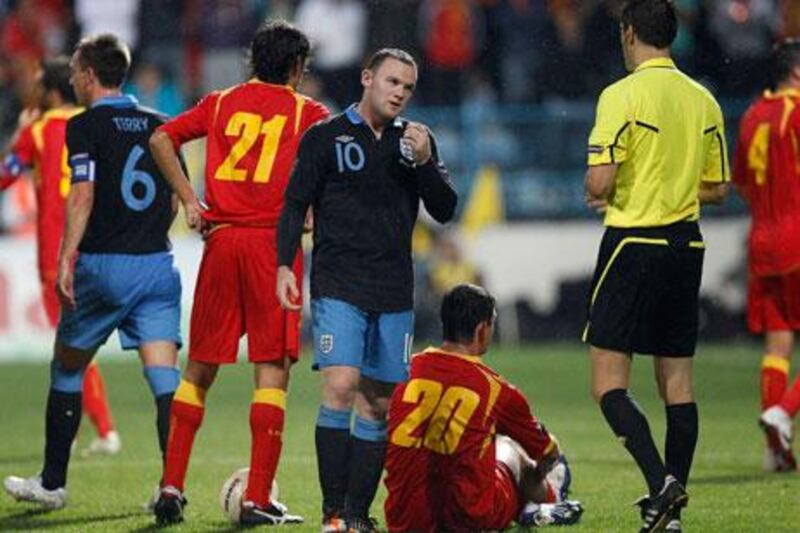England's hall of fame can double up as a roll of shame. Topping the list, the only players sent off twice in their country's colours, are David Beckham and Wayne Rooney.
Born 10 years apart, they are the icons of successive generations, despite having their careers disfigured by dismissals at World Cups. The similarities do not end there.
In each case, his disciplinary record was notably better for Manchester United than England: Beckham, sent off twice on international duty, was expelled only once in almost 400 games for the club; Rooney, red carded for a second time in Montenegro on Friday night, has only made an impromptu exit once in the last six years for United.
Sometimes Sir Alex Ferguson's powers can appear almost mythical, but the statistical evidence is that petulance surfaces less frequently when he is barking orders from the dugout.
In an interview over the weekend, Paul Gascoigne, who has often been told his descent could have been prevented had he joined United rather than Tottenham Hotspur, argued that the Scot's players have also misbehaved over the years.
It is true, even if much of the misconduct has occurred off the field and there is a clear link between Rooney's private and public lives.
That is not a complete explanation; indeed, nothing is. Rooney incurred a two-match ban, and missed last season's FA Cup semi-final defeat to Manchester City, for swearing into a television camera after scoring at West Ham United. An elbow on Wigan Athletic's James McCarthy should have resulted in a red card. Like his kick at Montenegro's Miodrag Dzudovic, it was utterly needless. The red mist also affects him when a Red Devil.
Nevertheless, it is no coincidence that his temperament is questioned less for club than country. Going into his three Champions League finals, for instance, few pondered the possibility of a volcanic explosion of Rooney's temper. It is certain to be a topic of conversation at Euro 2012.
Rooney's defenders - a rather smaller group than was the case this time last week - argue that removing his rage will rob him of much of his impact. Certainly he is unlikely to become a smiling assassin in the mould of Javier Hernandez or adopt the languid demeanour of Dimitar Berbatov, although that provides different grounds for criticism of the Bulgarian.
Channelling his anger is the key for Ferguson, a similarly combative character who has overstepped the mark himself in actions that tend to be attributed to a will to win.
Part of Rooney's appeal, as well as a reason for his prowess, is that he still resembles the street footballer, wanting to kick every ball and win every game, whatever its significance, and reacting with disappointment to setbacks, no matter how irrelevant in the bigger picture.
A cooler head would have rationalised that, while England's second-half performance in Podgorica was uninspiring, qualification for Euro 2012 nonetheless beckoned.
That, however, is not Rooney. It is why predictions of maturity have always seemed misplaced. He can get lost in the moment, a trait that is both strength and weakness. As to why such moments happen more frequently on international duty, a clue can be found in both form and fortune.
Rooney's last 18 caps have brought just three goals; in contrast, he has struck 18 times in his 20 most recent Premier League appearances. His time at United has brought 11 pieces of silverware, while England's drought, albeit with fewer trophies available, famously extends back to 1966.
There is a school of thought that the standard of the finest club sides exceeds that of the majority of their international counterparts. Certainly a study of United and England over the past few years would suggest that Ferguson's team have generally played to a higher standard, performing with the greater cohesion that familiarity offers and, crucially for Rooney, with the belief that unpromising positions can still be transformed into dramatic victories.
England lack that winning culture. As the frustration mounts, his fuse shortens. It is why Fabio Capello, the England coach, has more reasons to be worried than Ferguson. Excellence does not prevent Rooney from veering out of control, but it makes it less likely.
Rooney got off lightly
Rooney should at least be grateful that his indiscretions occurred in 2011, not 1998.
Beckham faced a national backlash after his red card against Argentina. Rooney can expect a hostile reception at Anfield against Liverpool on Saturday but, as a United player and former Evertonian, he would have got that anyway. Elsewhere, away games may become more of an ordeal, but without the same level of vilification.
Nor, while Capello will leave him out of the friendlies before Euro 2012, are there too many suggestions that he should miss the tournament itself as punishment whereas, 13 years ago, some were vocal in envisaging a future without Beckham.
In part, that reflects upon the realities of the situation: others might provide short-term stand-ins, but there is no other forward of his calibre at Capello's disposal.
But in an indirect way, it is another indication of how hamstrung managers are: one who was hired with a reputation as a disciplinarian cannot avoid the issue of player power.
England still need Rooney more than he may need them.






